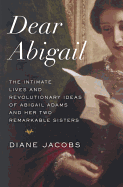
In Dear Abigail, Diane Jacobs returns to the topic of smart women in revolutionary times that she previously explored in Her Own Woman, her biography of Mary Wollstonecraft.
Readers are familiar with Abigail Adams thanks to her sharp-witted and loving correspondence with her husband--but John Adams wasn't the only person who benefited from Abigail's pen. In Dear Abigail, Jacobs uses the correspondence of Abigail and her sisters to build a picture of what it was like to watch the American Revolution from the sidelines.
Mary, Abigail and Betsy Smith were the daughters of a wealthy and influential Massachusetts minister. They were highly educated, well read and opinionated--and they married men who valued those qualities. In their letters, they complain about gender inequalities and household problems while discussing the intellectual issues of the time, from the theological questions of the Great Awakening to the philosophical underpinnings of revolution. They arrange to be inoculated for smallpox--a controversial issue at the time. They share news about the war. They worry about their parents, their husbands and their children.
Much of the book deals with the day-to-day difficulties of the war. Of the three sisters, Abigail suffered the most; some of the most poignant passages show her struggling alone with a difficult pregnancy and ultimate stillbirth. But all of them deal with shortages, lack of information and fear.
Dear Abigail is a perfect companion to David McCullough's John Adams. --Pamela Toler, blogging at History in the Margins

